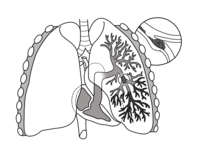
Photo from wikipedia
Abstract Rationale: Throughout the clinical course of acute myeloid leukemia (AML), aspergillosis infection remains a significant determinant of treatment outcomes and survival. To emphasize the importance of early diagnosis and… Click to show full abstract
Abstract Rationale: Throughout the clinical course of acute myeloid leukemia (AML), aspergillosis infection remains a significant determinant of treatment outcomes and survival. To emphasize the importance of early diagnosis and appropriate application of integrated therapeutic approaches, we present a case of AML patient who survived through angioinvasive aspergillosis infection causing diaphragmatic rupture with bowel perforation and cerebral aspergillosis during active AML treatment. Patient concerns: A 39-year old male with FLT3-mutated AML was transferred to our hospital due to persistent fever after induction therapy. Diagnosis and interventions: During voriconazole treatment for his invasive pulmonary aspergillosis, the patient was diagnosed with colon perforation at splenic flexure and suspected perforation of left diaphragm with communication with left pleural space. Although pancytopenic, emergency laparotomy was performed with granulocyte transfusion. Also, dual antifungal therapy with voriconazole and micafungin was applied. With supportive care, he was able to successfully complete 3 cycles of consolidation using tyrosine kinase inhibitor. However, 80 days after the last chemotherapy, the patient experienced seizure caused by a single 1.5 cm sized enhancing mass in the right occipital lobe. Diagnostic and therapeutic mass removal was carried out, and pathology-confirmed cerebral aspergillosis was diagnosed. Outcomes: The patient's neurologic symptoms are resolved and he is leukemia free, but remains on voriconazole for his cerebral aspergillosis till this day. Conclusions: Our case highlights the importance of timely integrated intervention and adequate underlying disease control in treatment of invasive aspergillosis in immunocompromised patients. Such rigorous efforts can save even the most seemingly dismal case.
Journal Title: Medicine
Year Published: 2022
Link to full text (if available)
Share on Social Media: Sign Up to like & get
recommendations!